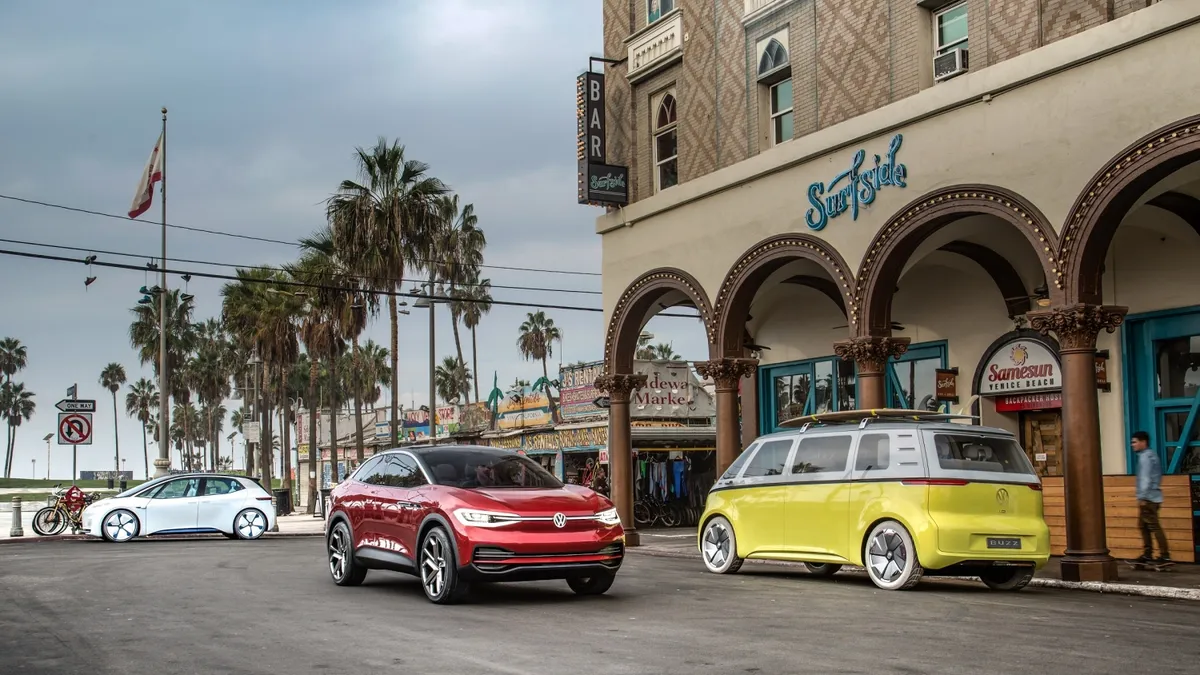Dive Brief:
- Volkswagen will pursue joint ventures with suppliers to sure up lithium battery production for electric vehicles, according to a Reuters report. Volkswagen board member Stefan Sommer told Reuters the company intends to partner with Sweden’s Northvolt, South Korea’s SKI, LG Chem, Samsung SDI and China’s CATL to boost its battery production capacity.
- Convincing suppliers to take a leap of faith on electric vehicle batteries can be difficult, however. "Not every supplier is convinced that electric mobility will come on such a large scale," Sommer told Reuters. "These producers need to prioritize between making a new smartphone or building a new battery factory. So even the battery cell producers are asking: will production volumes scale up quickly?"
- The majority of Volkswagen's electric vehicle batteries are currently produced in three of its component plants in Germany. According to Reuters, the company is refitting 16 factories to build electric vehicles and has plans to begin production of 33 new electric vehicle lines under its Skoda, Audi and Seat brands by mid-2023.
Dive Insight:
Currently, the pool of raw materials and suppliers for EV-specific lithium batteries is slim. The vast majority of the metals required are produced in China, and the production capacity for the batteries remains limited. This places automakers in a catch-22 of sorts where waiting lists for electric vehicles are growing into the tens of thousands but overall market demand, compared to gas-powered vehicles, hasn't been strong enough to kickstart the industrial shift needed to produce them at scale. As consumers face more delays before getting their cars, a problem Tesla has struggled with in particular, automakers worry they could jump ship.
According to Reuters, Volkswagen is anticipating the need for an additional 150 gigawatt hours of battery production capacity in Europe and 150 gigawatt hours worth in Asia by 2025 to meet projected consumer needs. It expects these figures to then double by 2030.
To sweeten the deal for suppliers, the company is pursuing a joint-venture model for new factories according to Reuters, giving suppliers finances for re-tooling and sharing the risk of shifting production capacity for electric vehicles. This could alleviate supplier concern about risk while giving Volkswagen added insight into how the manufacturing process is progressing and if there are any problems.
Sommer told Reuters 60% of the equipment in its existing factories can be refitted to produce the new batteries.
BMW is taking a similar approach to manufacturing its electric vehicles. The automaker has adapted its existing gas-powered vehicle assembly lines to produce new electric cars. BMW's goal is to scale its in-house electric vehicle battery production by 2020 and release 25 new EV models by 2025.
Like Volkswagen however, BMW and other automakers looking to transition to electric vehicles are facing challenges sourcing the lithium and cobalt they need to produce a sufficient quantity of batteries. As substitutes have yet to be found, automakers are focusing on streamlining manufacturing processes to reduce costs and minimize delays from sourcing.















